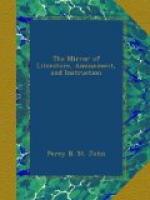2. The health of that useful animal the horse, which is probably liable to more disorders than any other (the human species excepted) will be much better preserved by woollen than a hairy covering.
3. There will be little occasion for saddles, &c. as the fleece will afford a very easy seat, much softer than leather, and well adapted for ladies and invalids.
Lastly.—There will be an annual acquisition of about 40 millions sterling, from this novel mode of procedure, of which please to accept the following algebraical demonstration:—
Let x be the unknown quantity; a, the horses; b, the sheep; then per simple equations x, plus a, plus b, minus tods, plus sheepskins, equal one thousand—then minus sheep, plus horses, minus wool, plus tods, equal one million. Lastly, horses plus sheep, minus hides, plus fleeces, in all equal forty millions.
Quod erat demonstrandum.
There, reader, if you are still a sceptic, I cannot help it.
JACOBUS.
* * * * *
ANSWER OF THE LONDON STONE.[2]
(For the Mirror.)
Why hast thou mortal, on my
slumber broken,
And dragged my
struggling spirit back to earth?
Though “walls have ears,”
yet stones have never spoken.
Why am I made
the object of thy mirth?
Why am I questioned thus to
tell my fate,
And primal use? Yet hear—whilst
I relate.
When time was young, and earth
was in her prime,
Secure I slept
within her spacious womb;
And ages passed—I
took no heed of time,
Until some Druid
burst my dismal tomb,
And dragged me forth amidst
the haunts of man.
And then, indeed my life of
woe began.
And ere great Caesar in triumphant
pride,
Led on by conquest,
bade Rome’s eagles soar
To this fair isle; full many
a victim died
Upon my breast,
and I was drenched with gore:
For “midst the tangling
horrors of the wood,”
I stood an altar, stained
with human blood.
I’ve witnessed scenes,
which I now dread to name,
I’ve seen
the captive bound in wicker rods
Expire, midst shouts, to feed
the sacred flame,
And glut the fury
of offended gods;
Those days soon passed—the
gospel’s milder ray
Dispelled the gloom, and spread
a brighter day.
Then superstition tottered
on her throne,
And hid her head
in shades of gloomy night;
Quenched were her fires—her
impious fanes o’er thrown,
Her mists dispersed
before the Prince of Light,
Then sank my grandeur; in
some lonely spot
I slept for years unnoticed
and forgot.
Until Vespasian, by Rome’s
stern command,
To quench rebellion
in my native isle,
Brought his bold legions from
a foreign strand,
Our land to torture,
and our towers to spoil;
He hewed me in a fashion now
unknown,
And dubbed me, what I am,
“The London Stone.”




